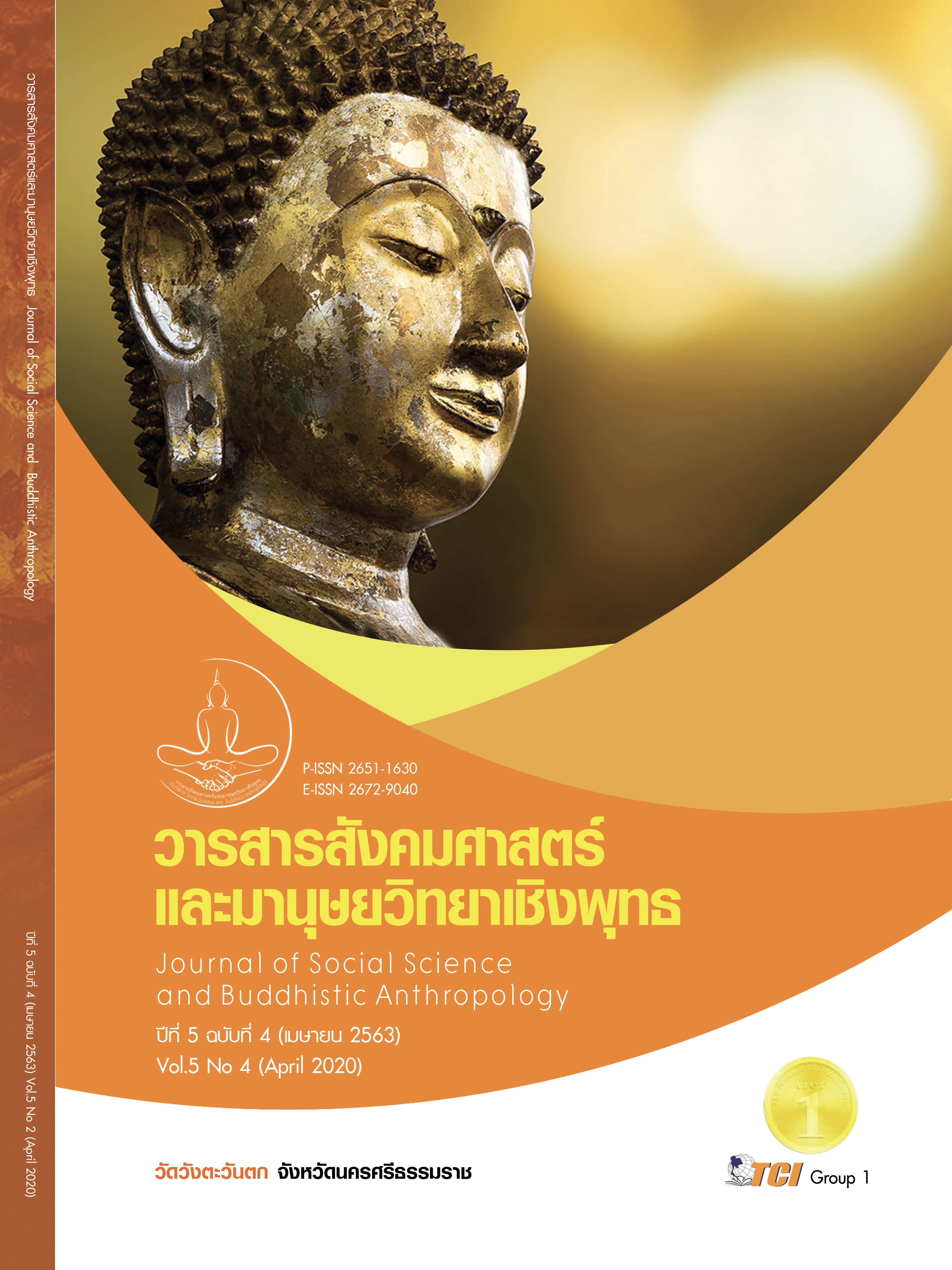THE RESOLUTION OF DOMESTIC VIOLENCE IN THAILAND
Keywords:
Domestic Violence, The Resolution of Domestic Violence, ViolenceAbstract
This research article aimed to study situation of domestic violence in Thailand and provided for solution on how to make the strategy plans on the resolution of domestic violence in Thailand. This qualitative research article has analyzed content by collecting data from a focus group discussion and in-depth interview of 22 key informants residing in Bangkok of which the in-depth interviews were comprised of 7 public officials, 1 private enterprise, and 6 academics and the focus group was comprised of 8 victims of domestic violence. It was found from this research that the problems and the resolution of domestic violence in Thailand were: Physical violence of which the problems were based on the tradition of men power control could be lessened by providing the knowledge of the domestic violence situation; Sexual violence included both sexual harassment and sexual assault could be lessened by educating the children in sexual prevention and increased more legal protection; Mental or Social violation which was mostly based on irony speech could be lessened by instilling values in childhood; Economic violence which was mostly come from the weak economic families could be lessened by providing the careers or income, supporting the community fund and fostering the community products. The appropriate authorities shall emphasize the strategy plans to tackle with the problems of domestic violence in Thailand in 5 approaches: creating women community development organizations; fostering the self-development programs; promoting family development learning; supporting the community and social development campaigns; planning legal framework and enforcement.
References
ธีรวุฒิ นิลเพ็ชร และกัญญ์ฐิตา ศรีภา. (2562). สภาพการณ์ความรุนแรงในครอบครัวและการพัฒนาบทบาทหน้าที่ของตำรวจในการรับมือปัญหาความรุนแรง: ศึกษาเฉพาะกรณีกองบังคับการตำรวจนครบาล 9. วารสารพยาบาลตำรวจ, 11(2), 326-338.
บีแอลที แบงค์คอก. (2561). เปิดสถิติความรุนแรงทางเพศของสังคมไทยยังน่าเป็นห่วง. เรียกใช้เมื่อ 16 พฤษภาคม 2562 จาก https://www.bltbangkok.com/news/4510/
ปรียาพร สุบงกช และกอบกุล วิศิษฏ์สรศักดิ์. (2559). รูปแบบการบริหารการพัฒนากลุ่มสตรีเพื่อเสริมสร้างความเข้มแข็งของชุมชน จังหวัดเพชรบุรี. Veridian E-Journal, Silpakorn University (สาขามนุษย์ศาสตร์ และสังคมศาสตร์), 9(2), 2255-2267.
พัชรินทร์ ศิริวิสุทธิรัตน์. (2555). คลังความรู้ทางวิชาการด้านสุขภาพจิตและจิตเวช กรม สุขภาพจิต กระทรวงสาธารณสุข. เรียกใช้เมื่อ 16 พฤษภาคม 2562 จาก www.klb.dmh.go.th/index.php?m=evaluation&op=home& gr=&researchId=1716
มูลนิธิปวีณาหงสกลุเพื่อเด็กและสตรี. (2561). สรุปสถิติรับเรื่องราวร้องทุกข์ ประจําปี 2561. เรียกใช้เมื่อ 16 พฤษภาคม 2562 จาก https://pavenafoundation.or.th/มูลนิธิ ปวีณาหงสกุลเพื่/
สำนักงานสาธารณสุขจังหวัดชัยภูมิ. (2555). ไทยติดอันดับ 7 “เด็ก - ผู้หญิง” ถูกกระทำความรุนแรงทั่วโลกในรอบ 7 ปี. เรียกใช้เมื่อ 16 พฤษภาคม 2562 จาก https://cpho.moph.go.th/wp/?p=8631
สุภางค์ จันทวานิช. (2553). วิธีการวิจัยเชิงคุณภาพ. (พิมพ์ครั้งที่ 15). กรุงเทพมหานคร: จุฬาลงกรณ์มหาวิทยาลัย.
อนุชิต ไกรวิจิตร. (2563). กทม. เผยเหตุความรุนแรงในครอบครัวปี 62 สูงกว่า 1 พันราย พบในช่วงวัย 26-59 ปีมากที่สุด. เรียกใช้เมื่อ 13 เมษายน 2563 จาก https:// thestandard.co/bangkok-unveil-violence-rate-in-families-2020/
Ahmadzad-Asl, M. et al. (2016). Domestic violence against women as a risk factor for depressive and anxiety disorders: findings from domestic violence household survey in Tehran, Iran. Archives of women's mental health, 19(5), 861-869.
Anderberg, D. et al. (2016). Unemployment and domestic violence: Theory and evidence. The Economic Journal, 126(597), 1947-1979.
Bessel A. van der Kolk, MD. (2017). Developmental trauma disorder: toward a rational diagnosis for children with complex trauma histories. Psychiatric annals, 35(5), 401-408.
Bloom, T. L. et al. (2018). Planting the TREE: A faith-based program for teen dating violence prevention. Spirituality in Clinical Practice, 5(3), 212.
Brem, M. J. et al. (2019). Cyber abuse among men arrested for domestic violence: Cyber monitoring moderates the relationship between alcohol problems and intimate partner violence. Psychology of Violence, 9(4), 410–418.
Cannon, M. C. et al. (2016). A survey of domestic violence perpetrator programs in the United States and Canada: Findings and implications for policy and intervention. Partner abuse, 7(3), 226-276.
Costa, B. M. et al. (2015). Longitudinal predictors of domestic violence perpetration and victimization: A systematic review. Aggression and violent behavior, 24(2015), 261-272.
Goodman, L. (2016). Domestic violence survivors’ empowerment and mental health: Exploring the role of the alliance with advocates. American journal of orthopsychiatry, 86(3), 286.
Gutierrez, I. A. & Gallegos, J. V. (2016). The effect of civil conflict on domestic violence: the case of Peru. Retrieved March 19, 2019, from https:// papers.ssrn.com/sol3/papers.cfm?abstract_id=2851158
Hyman, I. et al. (2000). Primary prevention of violence against women. Women's Health Issues, 10(6), 288-293.
Johnson, M. P. (2016). Confl ict and Control: Symmetry and Asymmetry in Domestic Violence. . New York: Routledge.
Ma, J. et al. (2016). Behavior problems among adolescents exposed to family and community violence in Chile. Family relations, 65(3), 502-516.
Postmus, J. L. et al. (2020). Economic abuse as an invisible form of domestic violence: A multicountry review. Trauma, Violence, & Abuse, 21(2), 261-283.
Stanley, N. & Humphreys, C. (2014). Multi-agency risk assessment and management for children and families experiencing domestic violence. Children and youth services review, 47(1), 78-85.
Sulhani, S. et al. (2019). Counselling Program of Pre-marital Education at the Office of Religious Affairs. In 3rd Asian Education Symposium (AES 2018) (pp.284 – 288). Bundung Indonesia: Atlantis Press.
Wang, Y. H. et al. (2017). Data for Social Good: A case study of building an effective public-private partnership on domestic violence prevention. Retrieved March 19, 2019, from https://www.semanticscholar.org/paper /Data-for-Social-Good-%3A-A-Case-Study-of-Building-an-Wang-Chen/4e592f328ba2c99a9362b151c71679d92e6da830
Zarling, A. et al. (2015). A randomized controlled trial of acceptance and commitment therapy for aggressive behavior. Journal of consulting and clinical psychology, 83(1), 199.









